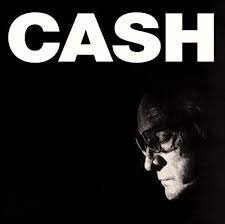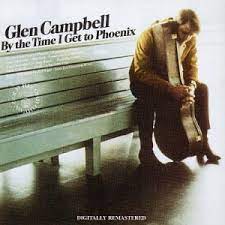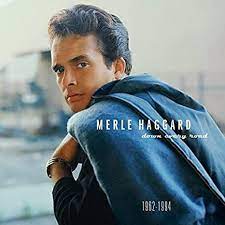Tutorial Pricing: $3.25ea OR any 10 for $10
(use code "Any10410" at checkout)
Paid Requests for $25ea
(comes with any 8 freebies -> so 9 for $25)
100's Of Free Demos & Chord Sheets
Best Ernest Tubb Guitar Songs
If you're a fan of traditional country music and honky-tonk rhythms, Ernest Tubb is a name you know well. This page features some of his most memorable hits arranged for acoustic guitar, with lessons designed to improve your rhythm, strumming, and country swing feel.

Whether you're just starting out or looking to add more classic country to your repertoire, these Ernest Tubb guitar tutorials will guide you through each song with chords, lyrics, and demo videos.
I Ain't Goin Honky Tonkin AnymoreI've Got All The Trouble I Can Handle
My Baby Don't Dance To Nothin But Ernest Tubb
Nails In My Coffin
Two Glasses Joe
Walkin The Floor Over You
Waltz Across Texas
Learn to Play Ernest Tubb’s Classic Hits on Acoustic Guitar
I Ain't Goin Honky Tonkin Anymore
- Learn To Play On Guitar
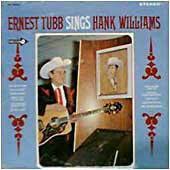
I Ain't Goin' Honky Tonkin' Anymore is a country song recorded by Ernest Tubb. It's a poignant and reflective song that touches on themes of change, personal growth, and leaving behind a certain lifestyle.
The track was released as a single by Ernest Tubb in 1964. The song was written by Tommy Collins. It received attention and recognition, though it may not be as well-known as some of Tubb's biggest hits.
"I Ain't Goin' Honky Tonkin' Anymore" was included on the album "Thanks a Lot" released in 1964. The album featured a mix of Tubb's songs, including other hits and well-known tunes from his repertoire.
Chords And Strumming
The chords here are C, C7, F, Am and a G played in standard tuning but with some lead work required. For rhythm play a root down up down up down up and repeat pattern.
Guitar Lesson Details
This Ernest Tubb classic is a slower honky-tonk number built on easy cowboy-style rhythm. We’ll cover the chords, walk you through the strumming feel, and help you capture the laid-back swing that defines this song.
Chords & Lyrics UnavailableBack To Song List
I've Got All The Troubles I Can Handle
- Learn To Play On Guitar
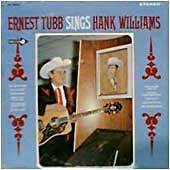
I've Got All the Troubles I Can Handle is a country song recorded by Ernest Tubb. It's a classic example of Tubb's honky-tonk style and his ability to convey emotions through his music.
The song was released as a single by Ernest Tubb in 1966. The song was written by Leon Ashley and Margie Singleton.
Like many of Tubb's songs, "I've Got All the Troubles I Can Handle" features a traditional country honky-tonk arrangement. The straightforward lyrics and Tubb's sincere delivery are hallmarks of his emotive singing style.
The song was included on the album "Ernest Tubb Sings Hank Williams" released in 1968. This album paid tribute to fellow country legend Hank Williams and featured Tubb's interpretations of Williams' songs.
The album "Ernest Tubb Sings Hank Williams" showcased Tubb's reverence for Hank Williams' music and legacy. The album included other classic Hank Williams tunes, such as "Your Cheatin' Heart" and "Cold, Cold Heart."
Chords And Strumming
This song is played on standard tuning with some lead and the chords, C, G, C7 and F. For rhythm I play a root down up down up down up and repeat pattern.
Guitar Lesson Details
This tune uses classic country phrasing and a simple chord progression. In this lesson, you’ll learn how to accent key beats and play in the traditional Ernest Tubb style with confidence.
Chords & LyricsBack To Song List
My Baby Don't Dance To Nothin' But Ernest Tubb (Junior Brown)
- Learn To Play On Guitar
My Baby Don't Dance To Nothin' But Ernest Tubb (Junior Brown) is a song that was recorded by Junior Brown about Ernest Tubb and not a recording by Ernest, but I thought I'd include it here on his page.
Chords And Strumming
It's played with a capo 2nd fret in standard tuning and with the chords G, E7, A7, D and D7 with a little picking required. I play this number with a root down up down up down up and repeat rhythm pattern.
Guitar Lesson Details
This fun modern tribute to Tubb has a great groove! You’ll get to work on steady rhythm, quick chord changes, and a style that mixes old and new country flair.
Chords & LyricsBack To Song List For Best Ernest Tubb Songs
Nails In My Coffin
- Learn To Play On Guitar
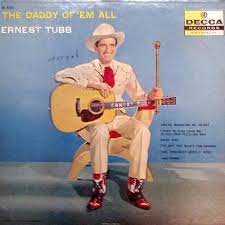
Nails in My Coffin was released by Ernest Tubb in 1946. The song gained popularity and became one of Tubb's signature tunes. It reached the top of the country music charts, solidifying its place as a classic in the genre.
"Nails in My Coffin" is a honky-tonk country song characterized by its straightforward lyrics and emotive vocals. Tubb's distinct singing style and the song's traditional country arrangement contribute to its timeless appeal.
"Nails in My Coffin" remains a classic example of honky-tonk country music. Its enduring popularity has led to it being covered by other artists and featured in various country music compilations.
Chords And Strumming
You can use a capo 3rd fret on this one in standard tuning and play it with a down down up down up down up and repeat rhythm pattern with a few riffs. The chords you'll need are an Em, G, C, D and a Dsus.
Guitar Lesson Details
This one features a strong country shuffle — a great opportunity to develop your rhythm accuracy. The chords are straightforward, and the strumming pattern really gives it that vintage feel.
Chords & LyricsBack To Song List
Two Glasses Joe
- Learn To Play On Guitar
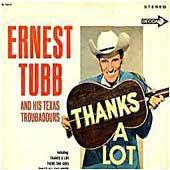
Two Glasses Joe is a country song recorded by Ernest Tubb. It was released as a single in 1963 and became one of Tubb's notable hits.
It was released as a single by Ernest Tubb in 1963. The song was written by Jerry Chestnut. It reached the top 10 of the country music charts, solidifying its place as a successful hit for Tubb.
"Two Glasses Joe" features a traditional country arrangement and Tubb's characteristic emotive vocals. The song's lyrics and melody work together to convey the melancholic and reflective mood of the narrative.
The track was included on the album "Thanks a Lot" released in 1964. The album contains a collection of songs, including other hits and well-known tunes from Tubb's repertoire
Chords And Strumming
This number is in standard tuning but required some lead work with the chords G, A7, D, D7, G7, C and a G6. For rhythm play a root, down up down up down up and repeat pattern.
Guitar Lesson Details
This slower ballad is ideal for practicing dynamic control and clean chord transitions. A great song to get that lonesome country barroom sound down pat.
Chords & LyricsBack To Song List For Best Ernest Tubb Songs
Walking The Floor Over You
- Learn To Play On Guitar
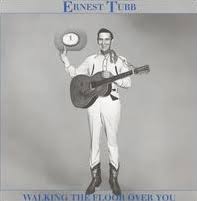
Walking the Floor Over You is a classic country song that became a major hit for Ernest Tubb and written by Ernest. It was released in 1941 and is considered one of Tubb's signature songs.
The track was released as a single by Decca Records in 1941. It became an instant hit, reaching number one on the country music charts and solidifying Ernest Tubb's status as a prominent country artist.
"Walking the Floor Over You" is often cited as one of the first honky-tonk songs. It features a distinctive rhythm and honky-tonk piano, elements that would go on to define the genre.
The song's popularity led to Tubb being invited to join the Grand Ole Opry in 1943.
Over the years, the song has been covered by various artists, contributing to its enduring popularity. Notably, in the 1970s, Tubb re-recorded the song as a duet with Loretta Lynn.
Chords And Strumming
For rhythm here you can play a root down bass up down up in standard tuning with the chords C, F, G, G7 and a C7. Some picing required in this number.
Guitar Lesson Details
The one that started it all! This lesson breaks down one of Ernest Tubb’s biggest hits with easy open chords and that classic country bounce that made him famous.
Chords & LyricsBack To Song List
Waltz Across Texas
- Learn To Play On Guitar
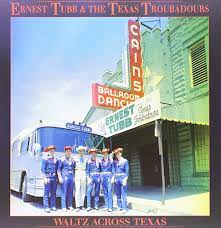
Waltz Across Texas is a country song written by Talmadge Tubb, the son of country music legend Ernest Tubb. The song was made popular by Ernest Tubb and became one of his signature songs.
It was released in 1965 as a single by Ernest Tubb. The song quickly gained popularity and became one of his biggest hits. It reached the top of the country music charts, solidifying its place as a classic in the country music genre.
"Waltz Across Texas" further solidified Ernest Tubb's status as a country music icon. The song became associated with his legacy and added to his catalog of classic hits
Chords And Strumming
I play a drop D tuning here with a capo 2nd fret and some lead. Only two chords here with a G and D and you play a root up down up down up and repeat rhythm pattern.
Guitar Lesson Details
Chords & LyricsBack To Song List For Best Ernest Tubb Songs
This Texas waltz offers a chance to play in 3/4 time and build fluidity with a traditional country strum. It’s slow, pretty, and great for mastering smooth chord changes.
Some fun facts about Ernest Tubb
Ernest Tubb was an American singer and songwriter who played a significant role in the country music genre. He was born on February 9, 1914, in Crisp, Texas, and he passed away on September 6, 1984. Tubb is often referred to as the "Texas Troubadour."
Ernest Tubb was known for his distinctive voice, honky-tonk style, and contributions to the development of country music, particularly during its early years and the post-war era.
Tubb's music career began in the 1930s, and he gained prominence in the 1940s and 1950s. He started performing on local radio stations and later joined the Grand Ole Opry, a famous country music radio show.
Tubb is credited with introducing the electric guitar to country music. He incorporated it into his band, The Texas Troubadours, helping to shape the honky-tonk sound and paving the way for the use of electric instruments in the genre.
Some of Tubb's popular songs include "Walking the Floor Over You," "Waltz Across Texas," "Drivin' Nails in My Coffin," and "Rainbow at Midnight." These songs became classics and are still celebrated in country music circles.
Tubb's music had a significant influence on the development of honky-tonk and traditional country music. His heartfelt and emotive singing style resonated with audiences and fellow musicians.
He founded his own record label, "Ernest Tubb Record Shop," which helped him gain more control over his music and its distribution. The record shop in Nashville, Tennessee, also became a hub for country music fans.
Ernest Tubb is considered one of the pioneers of country music. He influenced many later artists, including Merle Haggard, Willie Nelson, and George Jones. His contributions to the genre earned him a place in the Country Music Hall of Fame.
Tubb was known for his cowboy hat, suits, and ties, which became his signature style. He embodied the image of a traditional country artist.
Thank you for dropping by my Ernest Tubb songs page.
If you liked this best Ernest Tubb guitar songs page, you might like ... (click images)
Home Page
Very Easy Country Guitar Songs
